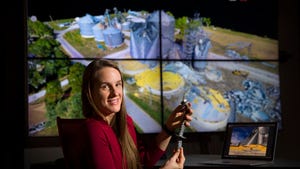Study highlights success of changing diet for reproduction in endangered species.
October 27, 2017

A study published recently in the journal Pachyderm highlights the ongoing effort of accredited zoos to address challenges and improve the sustainability of endangered species populations in their care.
The study, co-authored by scientists from San Diego Zoo Global and Mars Hill University, evaluated fertility issues in captive-born southern white rhinos and determined that diets including soy and alfalfa were likely contributors to breeding challenges.
"The captive southern white rhinoceros (SWR) population is not currently self-sustaining, due to the reproductive failure of captive-born females," said Dr. Christopher Tubbs, San Diego Zoo Global and lead author of the paper. "Our research into this phenomenon points to chemicals produced by plants present in captive diets, such as soy and alfalfa, as likely causes."
Soy and alfalfa are commonly included in feeds for many herbivorous animals under human care; however, these diets have high levels of phytoestrogens that disrupt normal hormone functions in some species, the researchers said.
The study reviews historical data on the reproductive success of SWRs in zoos in North America. These studies discovered that female rhinos born in captive environments displayed lower reproductive levels. At the San Diego (Cal.) Zoo Safari Park, animal care staff switched to a low phytoestrogen diet for SWRs in their care in 2014. The nutritional change appears to be an effective means of addressing the challenge.
"Following our diet modification, routine monitoring of the reproductive status of our female SWR suggested that the diet change was having a positive impact," Tubbs said. "Two females that had previously not reproduced have now become pregnant and successfully given birth to healthy calves."
Bringing species back from the brink of extinction is the goal of San Diego Zoo Global. As a leader in conservation, the work of San Diego Zoo Global includes on-site wildlife conservation efforts (representing both plants and animals) at the San Diego Zoo, San Diego Zoo Safari Park and San Diego Zoo Institute for Conservation Research, as well as international field programs on six continents. The work of San Diego Zoo Global is made possible by the San Diego Zoo Global Wildlife Conservancy and is supported, in part, by the Foundation of San Diego Zoo Global.
You May Also Like


.png?width=300&auto=webp&quality=80&disable=upscale)
